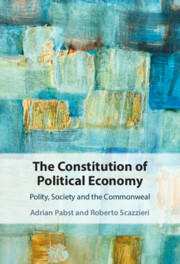‘Adrian Pabst and Roberto Scazzieri’s sophisticated analysis combines deep knowledge of intellectual history with critical assessment of the methods of political science and economics. They offer a better way of understanding the complex interdependencies between politics and the economy. Both disciplines - as well as historians - will benefit from their call for a new approach to political economy that understands economics and politics as mutually embedded.’
Martin Daunton - Emeritus Professor of Economic History, University of Cambridge
‘The fascination of this book derives from its blend of scholarship and innovation. Guiding us through an impressive body of economic and political theory, the authors make the case for their ‘constitutionalist’ political economy approach, which reveals the intertwining of structural economic relationships and constellations of interests, explores the issue of political agency, and studies the conditions for systemic stability. Pabst and Scazzieri remind us of the interdependencies that bind societies together and make us reconsider the foundations of the ‘commonweal’. Also noticeable is their analysis of relatively neglected authors, including seventeenth- and eighteenth-century Neapolitan writers.’
Lilia Costabile - University of Naples Federico II and Clare Hall, Cambridge
‘A penetrating analysis of how a toxic mix of Neoclassical assumptions and post-modernism combined to veil most of the real action in politics and economics in mainstream studies of political economy. The book raises fundamental questions that have been ignored far too long and it presents answers everyone needs to grapple with, not just specialists, but citizens and journalists.’
Thomas Ferguson - Research Director, Institute for New Economic Thinking
‘Well-structured and thoughtfully written, The Constitution of Political Economy addresses a truly original task: showing why the two main approaches to the study of political economy are fundamentally defective. Pabst and Scazzieri advance a new approach that combines, in a creative way, the economy and polity dimensions. By drawing from both the constitutional tradition in the political discourse and the structural tradition in economic thought, this book will change the way both economists and political scientists, of all stripes, understand the work they do, and will suggest a viable route to cope with the challenges and poli-crises of the present epoch. This book is an impressive tour de force that is long overdue and that will provide inspiration for researchers and students across a wide range of fields.’
Stefano Zamagni - Professor of Civil Economy, University of Bologna
‘The Constitution of Political Economy by Pabst and Scazzieri provides a novel attempt to outline a theory beyond the boundaries of economics and politics. The study redefines political economy as a plurality of internal hierarchies subject to multiple relationships which prevail within economic and political spheres. With the approach in the book leading to a constitutionalist view of the political economy, the study develops the notion of embedded policy-making, which considers economic policy as actions designed and implemented at the interface between the economic and the political spheres.’
Sunanda Se - Research Associate, Levy Economics Institute and Life member Clare Hall Cambridge
‘There is a growing sense that economics urgently requires a turn towards political economy if it is to deal with the pressing policy issues facing society. Adrian Pabst and Roberto Scazzieri set out a new political economy framework which emphasises the complex, evolving and multi-layered interdependencies between the economy, the polity and society. This erudite contribution provides a solid basis for the constructive integration of economic and political theory.’
Sheila Dow - University of Stirling





